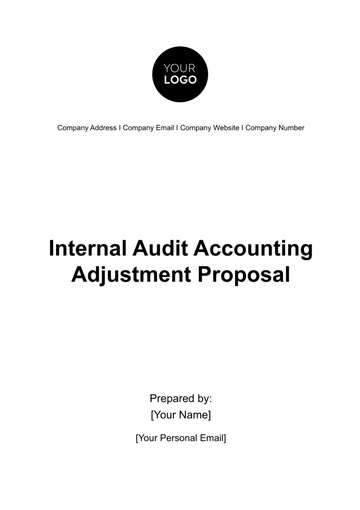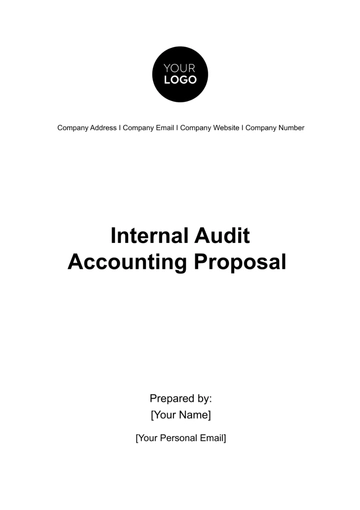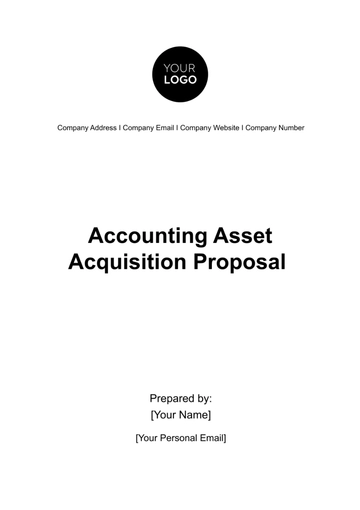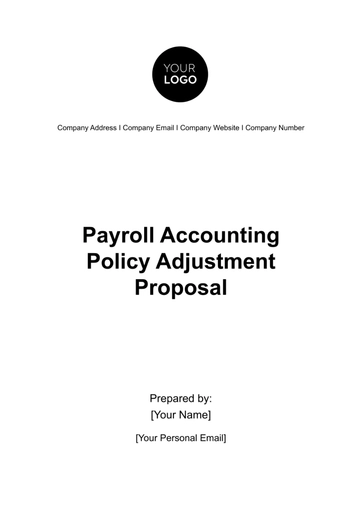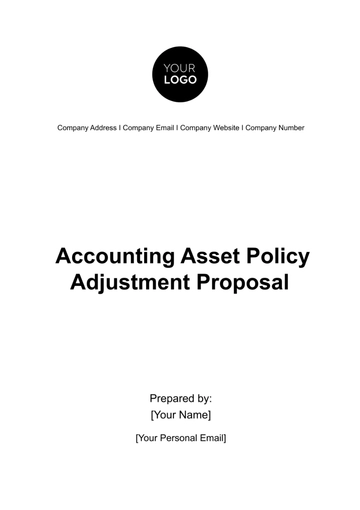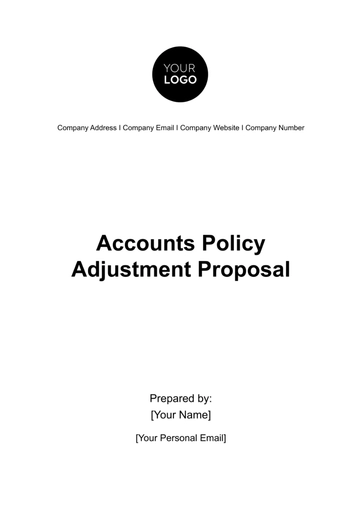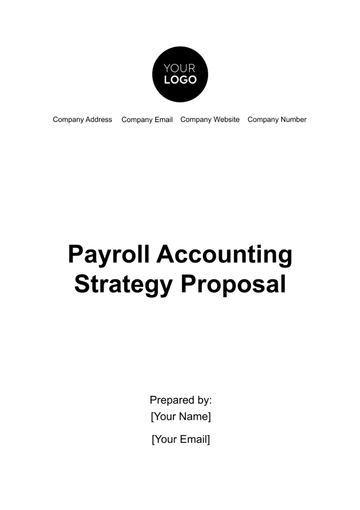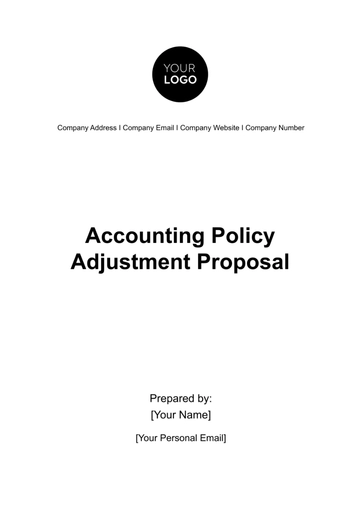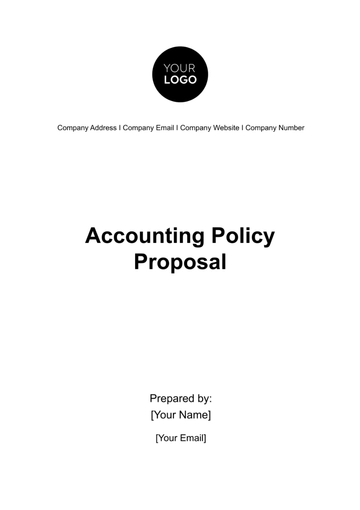Free Internal Audit Accounting Proposal
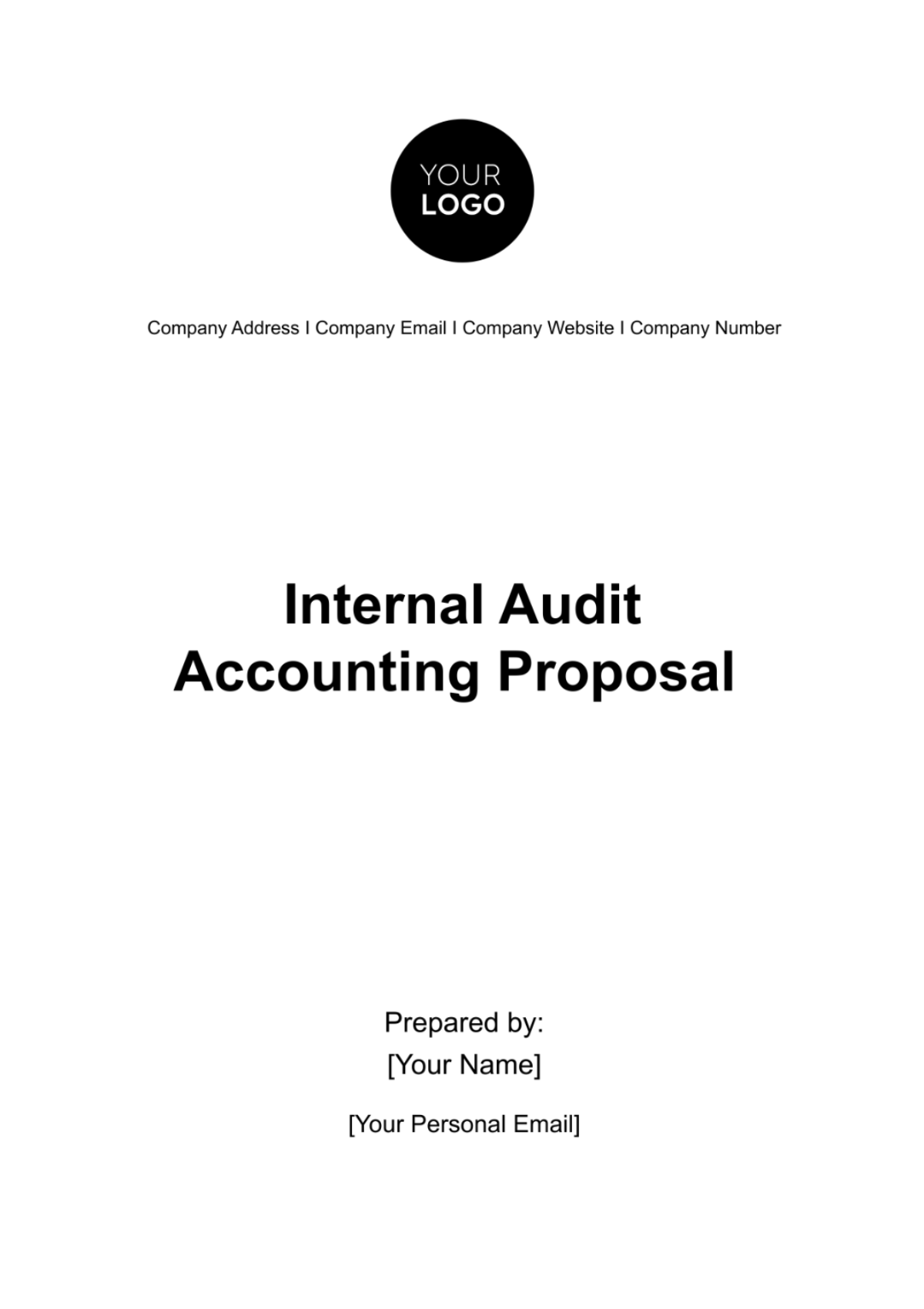
Executive Summary
This proposal aims to enhance the efficiency and integrity of accounting practices at [Your Company Name] by implementing an Internal Audit Accounting system. The initiative is designed to revamp the current accounting methodologies, ensuring they are both robust and agile enough to meet the dynamic needs of the business landscape. By adopting this system, [Your Company Name] commits to a proactive approach in managing its financial operations, promoting transparency, and safeguarding stakeholder interests.
Objectives
The following objectives serve as the cornerstone of our proposal for the implementation of Internal Audit Accounting at [Your Company Name]. Each objective is meticulously designed to address specific areas of improvement within our financial operations, fostering a culture of integrity, precision, and strategic efficiency. Through the realization of these objectives, we anticipate setting new benchmarks for accountability and performance in our financial management practices.
Strengthen Internal Control Systems: Central to our proposal is the reinforcement of the company’s internal control systems. By integrating Internal Audit Accounting, we aim to significantly reduce the risk of inaccuracies and ensure the utmost reliability of our financial records, thereby facilitating more strategic and informed decision-making processes.
Enhance Compliance with Financial Regulations: Compliance with financial regulations remains a top priority. The proposed system is designed to implement a thorough review mechanism that ensures all financial operations are executed in strict adherence to the relevant laws and standards, thereby upholding the company's legal and ethical integrity.
Boost Accuracy in Financial Reporting: Our commitment to this objective involves the implementation of rigorous audit procedures and ongoing scrutiny to minimize errors in financial statements, thus enhancing the trustworthiness and reliability of our financial disclosures.
Optimize Resource Allocation: An effective Internal Audit Accounting system will also enable us to identify and rectify inefficiencies within our financial operations. By providing targeted recommendations for improvement, we aim to ensure that resources are allocated in the most efficient manner possible, thereby improving our overall financial health and operational performance.
Facilitate Continuous Improvement: Our commitment to continuous improvement goes beyond implementation. We envision an environment where internal audits and feedback mechanisms are integrated seamlessly into our operations. This objective ensures that our financial processes remain agile and responsive to changing business dynamics, regulatory updates, and emerging best practices.
Empower Our Workforce: An informed and skilled workforce is essential for the success of any financial transformation. We aim to empower our employees through comprehensive training and development programs. By equipping our team with the necessary skills and knowledge to excel in the realm of internal audit accounting, we invest in the long-term success of our company.
The successful implementation of these objectives through the Internal Audit Accounting system will mark a significant milestone in [Your Company Name]'s journey towards financial excellence and operational superiority. This initiative is a testament to our unwavering commitment to continuous improvement, accountability, and strategic growth.
Methodology
To ensure the successful realization of our objectives as outlined in the proposal, we will adopt a comprehensive and systematic methodology. This approach is structured to assess, enhance, and sustain the efficiency and integrity of our accounting processes through the following meticulously planned stages:
Assessment of Current Accounting Practices: The initial phase involves a thorough evaluation of our existing accounting frameworks and procedures. This comprehensive review will span all departments and units, aiming to establish a baseline understanding of our current practices. By employing both quantitative and qualitative analysis methods, we will gain insights into the effectiveness, efficiency, and compliance of our existing accounting operations.
Identification of Gaps and Room for Improvement: Building on the insights gained from the initial assessment, this stage focuses on pinpointing discrepancies, inefficiencies, and potential risks within the current accounting framework. A critical analysis will be conducted to identify areas that require enhancement, modification, or complete overhaul. This phase is crucial for setting clear targets for the internal audit system’s design and implementation.
Designing and Implementing an Internal Audit System: With a clear understanding of the existing gaps and areas for improvement, the next step involves the design and implementation of a robust internal audit system tailored to our specific needs. This system will be developed to address the identified shortcomings, incorporating best practices and leveraging the latest technologies to ensure a high level of precision and reliability. The design phase will be followed by a structured implementation process, ensuring seamless integration with our existing operations while minimizing disruption.
Continuous Monitoring and Evaluation of the System's Performance: The final stage of our methodology emphasizes the importance of ongoing oversight and assessment of the internal audit system's effectiveness. Through regular audits, performance reviews, and feedback mechanisms, we will continuously monitor the system’s outcomes against the set objectives. This approach allows for real-time adjustments and enhancements, ensuring the system remains aligned with our business needs and regulatory requirements.
This methodical approach ensures a holistic transformation of [Your Company Name]'s accounting operations, from initial assessment to continuous improvement. By systematically addressing each stage, we aim to foster a culture of excellence in financial management, characterized by transparency, compliance, and strategic foresight.
Scope
This proposal is designed to encompass the entirety of [Your Company Name]'s accounting process. This recognizes the intricate interplay between various departments, both directly and indirectly engaged in the orchestration of the organization's financial functions. This proposal adopts a holistic approach, ensuring that no facet of our accounting practices remains untouched. It is a testament to our commitment to precision and thoroughness in revamping our financial operations.
Timeline
The successful execution of this proposal requires a well-structured timeline to ensure a smooth transition to the Internal Audit Accounting system. The following table outlines the key milestones and estimated timeframes for each phase of the implementation process:
Activity | Timeframe |
|---|---|
Assessment and Diagnosis | [Month Day, Year] - [Month Day, Year] |
The timeline provided serves as a guideline for the structured execution of this proposal. It emphasizes the importance of thorough planning, execution, and continuous monitoring throughout the implementation process. The post-implementation phase (Phase 4) is an ongoing commitment to maintaining the efficiency and effectiveness of the Internal Audit Accounting system beyond its initial deployment.
Budget
The successful implementation of the Internal Audit Accounting system requires a well-structured budget to ensure that financial resources are allocated effectively and efficiently. The following table provides an estimated breakdown of the budget for this initiative:
Item | Estimated Cost |
|---|---|
Personnel Costs | $5,000 |
The budget outlined in this table reflects our commitment to ensuring that the Internal Audit Accounting system is adequately funded to achieve its objectives. It covers various aspects, including personnel, technology, training, compliance, and contingencies, to ensure a comprehensive and successful implementation.
Benefits
The implementation of internal audit accounting within [Your Company Name] promises a multitude of tangible benefits, each contributing to the enhancement of our financial ecosystem, regulatory compliance, and the strengthening of our competitive edge within the industry.
Enhanced Financial Management: The introduction of internal audit accounting brings a heightened level of precision and transparency to our financial processes. It empowers us with the tools to meticulously oversee financial operations, detect discrepancies, and rectify them promptly. This newfound clarity and control translate into more accurate financial data, enabling us to make informed decisions with confidence. By optimizing resource allocation, we ensure that every financial aspect of the organization operates at peak efficiency.
Stricter Regulatory Compliance: In an era marked by evolving financial regulations and heightened scrutiny, the adoption of internal audit accounting is a proactive step towards ensuring that [Your Company Name] remains fully compliant with all pertinent regulatory provisions. It sets the stage for rigorous audits and assessments, guaranteeing that our financial activities align seamlessly with industry-specific laws and standards. This commitment to compliance not only safeguards our reputation but also mitigates potential legal risks.
Cost Efficiency: The implementation of Internal Audit Accounting streamlines our financial processes, reducing inefficiencies and minimizing operational costs. By identifying areas where resources can be allocated more effectively, we optimize our cost structure, ensuring that every financial aspect of the organization operates efficiently.
Resource Allocation: With the precision and transparency afforded by Internal Audit Accounting, we gain a deeper understanding of our resource needs. This knowledge allows us to allocate resources judiciously, ensuring that funds, manpower, and assets are deployed where they can have the greatest impact, ultimately enhancing our financial health.
Competitive Advantage: A well-established internal audit accounting system sets us apart as an organization committed to excellence and integrity in financial management. This dedication to precision and accountability becomes the foundation of our competitive advantage. It instills trust among stakeholders, including investors, partners, and clients, enhancing our standing within the industry. Our ability to provide reliable financial information can influence critical business decisions and foster enduring relationships.
Proactive Risk Mitigation: The implementation of internal audit accounting allows us to proactively identify and address potential financial risks. By conducting regular audits and assessments, we can swiftly detect vulnerabilities and implement strategies to mitigate them. This proactive stance minimizes the likelihood of financial crises and reinforces our ability to navigate economic challenges effectively.
Strategic Agility: The ability to adapt to changing circumstances is a hallmark of a successful organization. Internal Audit Accounting enhances our strategic agility by providing timely insights into financial performance and trends. This agility allows us to pivot quickly in response to market shifts, capitalize on opportunities, and mitigate risks effectively.
Partner Confidence: Our partners, including suppliers, distributors, and service providers, place trust in our financial stability. By maintaining transparent and reliable financial practices through Internal Audit Accounting, we inspire confidence in our partners. This confidence can lead to extended partnerships, favorable terms, and enhanced business synergies.
Improved Decision-Making: Accurate and timely financial information is essential for strategic decision-making. Internal audit accounting ensures that decision-makers have access to trustworthy data, enabling them to formulate well-informed strategies and initiatives. This alignment of financial data with strategic goals positions us for sustainable growth and adaptability in a competitive business market.
The adoption of internal audit accounting at [Your Company Name] is a strategic commitment to excellence, compliance, and financial resilience. These benefits collectively foster a robust financial ecosystem, enabling us to thrive, lead, and innovate within our industry while safeguarding the interests of our stakeholders.
Long-term Financial Sustainability
In addition to the previously mentioned benefits, the implementation of Internal Audit Accounting at [Your Company Name] also fosters long-term financial sustainability. This specific subsection highlights how this initiative contributes to the sustainability and adaptability of our organization:
Enhanced Risk Management: Internal Audit Accounting equips us with robust risk assessment and management tools. By continuously monitoring financial processes and identifying potential risks, we can proactively implement measures to mitigate these risks, ensuring our financial stability in an ever-changing business landscape.
Strategic Planning and Growth: With accurate and timely financial information at our disposal, we are better equipped to develop strategic plans for sustainable growth. Data-driven insights enable us to identify market opportunities, optimize resource allocation, and make informed decisions that contribute to our long-term financial success.
Investor and Stakeholder Confidence: Long-term financial resilience is closely tied to the trust and confidence of investors and stakeholders. Through the implementation of Internal Audit Accounting, we instill confidence by providing transparent, reliable, and audited financial data. This trust is invaluable in attracting investment and ensuring enduring relationships with stakeholders.
Adaptability to Market Shifts: The dynamic nature of business requires adaptability. Internal Audit Accounting equips us with the agility to respond swiftly to market shifts, economic changes, and regulatory updates. This adaptability ensures that [Your Company Name] remains resilient in the face of external challenges.
Sustainability and Continuity: Financial resilience is synonymous with sustainability. By maintaining a robust financial foundation, we ensure the continuity of our operations, even in adverse conditions. This resilience not only secures our future but also allows us to weather uncertainties with confidence.
Incorporating long-term financial sustainability into the benefits of Internal Audit Accounting highlights the strategic foresight embedded in this initiative. It reinforces our commitment to not only immediate improvements but also the enduring financial health and adaptability of [Your Company Name].
Risks and Mitigation
The adoption of new accounting practices, such as internal audit accounting, inherently carries certain risks and potential challenges. However, at [Your Company Name], we recognize the importance of proactive risk management and have devised a comprehensive plan to mitigate these potential hurdles.
Resistance to Change: It is natural for employees to exhibit resistance to change when introducing new accounting practices. To address this, we will implement a robust change management strategy. This will include clear and consistent communication regarding the reasons behind the change, its benefits, and the impact on daily operations. Additionally, a training and development program will be designed to equip our team with the necessary skills and knowledge to embrace the new practices confidently.
Operational Disruption: The transition to internal audit accounting may temporarily disrupt our daily operations. To minimize this risk, we will carefully plan the implementation process, ensuring that critical functions continue to operate smoothly during the transition. A phased approach will be considered to limit disruption, and contingency measures will be in place to address any unexpected challenges.
Data Security and Privacy Concerns: With the introduction of new systems and technologies, concerns related to data security and privacy may arise. To mitigate these risks, we will prioritize data security by implementing robust cybersecurity measures. This includes data encryption, access controls, and regular security audits to safeguard sensitive financial information.
Compliance Challenges: The shift to internal audit accounting necessitates a deep understanding of evolving financial regulations. To mitigate the risk of non-compliance, we will engage with legal and regulatory experts to ensure that our practices align with all applicable laws and standards. Regular audits and compliance checks will be conducted to monitor adherence.
Resource Constraints: Implementing internal audit accounting may require additional resources, including technology and personnel. To address resource constraints, we will carefully allocate our budget, ensuring that sufficient resources are available for the successful implementation of the new practices. Efficient resource utilization will be a key focus.
Integration with Existing Systems: Ensuring seamless integration of internal audit accounting with our existing systems and processes is crucial. We will conduct rigorous testing and quality assurance measures to identify and resolve any compatibility issues. Additionally, a dedicated team will oversee the integration process to guarantee its effectiveness.
There are inherent risks associated with adopting new accounting practices, our commitment to proactive mitigation strategies and thorough planning positions us for a successful transition. We understand the importance of clear communication, training, security, compliance, resource management, and integration to address these risks effectively. Through these measures, we aim to not only mitigate potential challenges but also capitalize on the opportunities for growth and improvement that internal audit accounting offers.
Conclusion
The proposed integration of Internal Audit Accounting within [Your Company Name] stands as a pivotal step toward safeguarding our financial integrity and fueling the growth trajectory of our company. We earnestly request your unwavering support to ensure the seamless and successful implementation of this proposal. Your support is a cornerstone upon which our collective vision for a more robust and resilient financial future is built. Together, we can forge a path towards excellence, transparency, and sustained prosperity for [Your Company Name].
- 100% Customizable, free editor
- Access 1 Million+ Templates, photo’s & graphics
- Download or share as a template
- Click and replace photos, graphics, text, backgrounds
- Resize, crop, AI write & more
- Access advanced editor
The Internal Audit Accounting Proposal Template from Template.net is the ultimate solution for crafting compelling audit proposals. Fully editable and customizable, it allows users to adapt content to fit their unique audit scenarios seamlessly. With the convenience of our Ai Editor Tool, modifying the template to meet your exact needs has never been easier.
You may also like
- Business Proposal
- Research Proposal
- Proposal Request
- Project Proposal
- Grant Proposal
- Photography Proposal
- Job Proposal
- Budget Proposal
- Marketing Proposal
- Branding Proposal
- Advertising Proposal
- Sales Proposal
- Startup Proposal
- Event Proposal
- Creative Proposal
- Restaurant Proposal
- Blank Proposal
- One Page Proposal
- Proposal Report
- IT Proposal
- Non Profit Proposal
- Training Proposal
- Construction Proposal
- School Proposal
- Cleaning Proposal
- Contract Proposal
- HR Proposal
- Travel Agency Proposal
- Small Business Proposal
- Investment Proposal
- Bid Proposal
- Retail Business Proposal
- Sponsorship Proposal
- Academic Proposal
- Partnership Proposal
- Work Proposal
- Agency Proposal
- University Proposal
- Accounting Proposal
- Real Estate Proposal
- Hotel Proposal
- Product Proposal
- Advertising Agency Proposal
- Development Proposal
- Loan Proposal
- Website Proposal
- Nursing Home Proposal
- Financial Proposal
- Salon Proposal
- Freelancer Proposal
- Funding Proposal
- Work from Home Proposal
- Company Proposal
- Consulting Proposal
- Educational Proposal
- Construction Bid Proposal
- Interior Design Proposal
- New Product Proposal
- Sports Proposal
- Corporate Proposal
- Food Proposal
- Property Proposal
- Maintenance Proposal
- Purchase Proposal
- Rental Proposal
- Recruitment Proposal
- Social Media Proposal
- Travel Proposal
- Trip Proposal
- Software Proposal
- Conference Proposal
- Graphic Design Proposal
- Law Firm Proposal
- Medical Proposal
- Music Proposal
- Pricing Proposal
- SEO Proposal
- Strategy Proposal
- Technical Proposal
- Coaching Proposal
- Ecommerce Proposal
- Fundraising Proposal
- Landscaping Proposal
- Charity Proposal
- Contractor Proposal
- Exhibition Proposal
- Art Proposal
- Mobile Proposal
- Equipment Proposal
- Student Proposal
- Engineering Proposal
- Business Proposal




